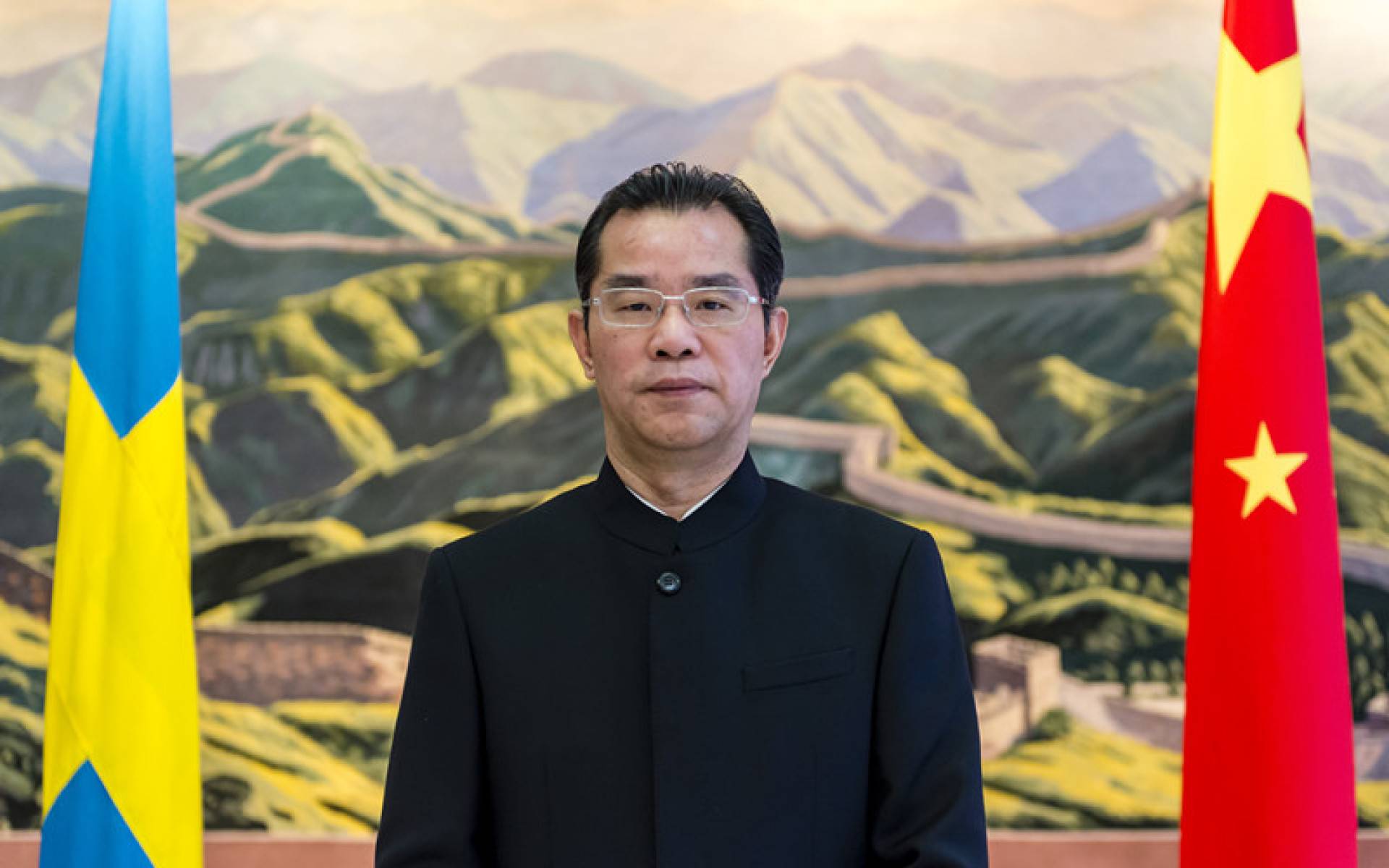Enlight Studies together with Utblick Göteborg start an article exchange collaboration as a testimony of mutual learning, practice exchange, and stimulating analytical thinking.
By:Sebastian Vogel and Nathanaël Fritz.Originally published at Utblick
The fourth of December, the Society of International Affairs of Gothenburg organised a lecture with the Chinese Ambassador to Sweden H. E. Gui Congyou. He is an old-school diplomat, known for his impulsive statements and so-called “shotgun diplomacy.” In this very lecture, he remarked that, after years of worsening relations, it is time that trade relations between China and Sweden shall be affected. After the lecture, he specified this by foreshadowing “restrictions” on the Swedish economy.
We also talked with the Ambassador before the lecture, focusing more on issues on the global agenda. We started with the Hong Kong protests, went to Uyghurs and approached international affairs like the South China Sea conflict and trade talks. We concluded with global hegemony and the soft power projection of Confucius Institutes.
The Ambassador spoke in Mandarin with a translator. We pruned and edited the interview to increase readability.
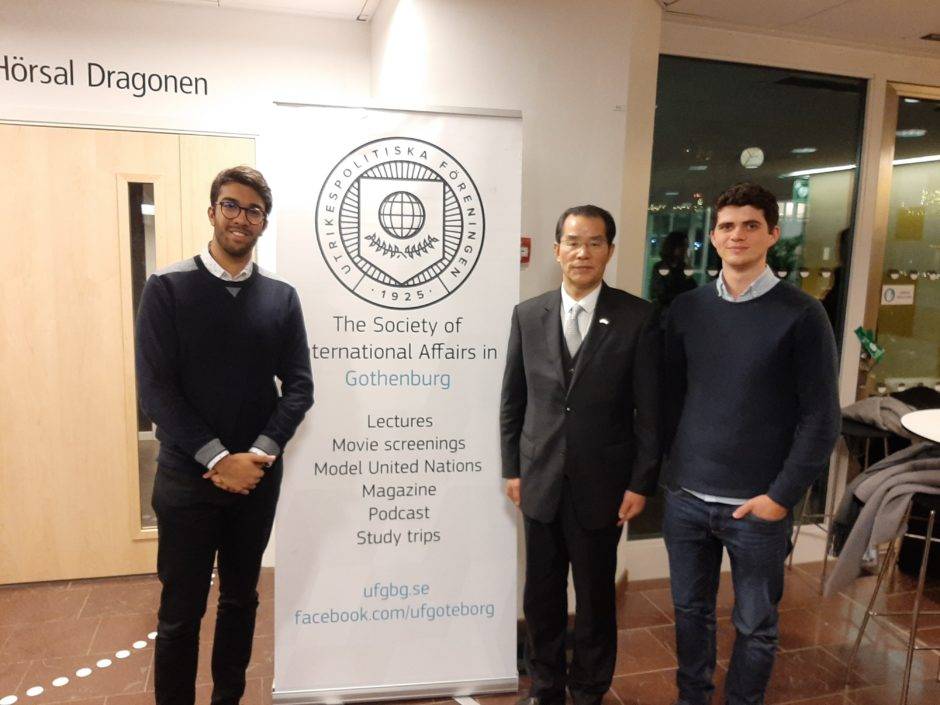
Hong Kong: International Reactions, International Interference
UTBLICK. So, the first question is about contemporary events – the Hong Kong protests: Several Nordic countries have urged students to leave their dormitories. What advice would you give to students who think about doing an exchange and people who want to travel to Hong Kong in the near future?
Ambassador. First of all, we welcome young students coming to Hong Kong for education and visits. Indeed it is unfortunate that the situation is like this in Hong Kong. The vandalisations, setting buildings on fire and other violent behaviours by the students to express their ideas is against the rule of law in Hong Kong. The most urgent task in Hong Kong is to put an end to chaos and violence. And, of course, if Nordic students do not feel safe in Hong Kong, because of the vandalization and arson we respect their choice if they want to leave Hong Kong for a while or postpone visits to Hong Kong.
But, I’ve been reading in Swedish media that there was this Swedish friend who was in Hong Kong and after coming back said to personally not have felt insecure in Hong Kong. Of course, we are not in the best place to judge, because we are not in Hong Kong. We hope relevant people do pay attention to their security. We also hope that a signal will be sent to the people in Hong Kong that vandalization, setting fires and such things go against the rule of law.
UTBLICK. In July, the European Parliament passed a resolution supporting some demands of protesters in Hong Kong. In November, Donald Trump signed the so-called Human Rights Act. The European Commission has already expressed concerns about actions by Hong Kong law enforcement. How would you evaluate the odds that the new commission will present similar measures as the US, following the given sentiment in the European Parliament?
Ambassador. First of all, Hong Kong is part of China. Hong Kong is an internal affair of China. According to the UN Charter, no country is allowed to interfere in another country’s internal affairs, this is also part of international customs.
The very fact that some violent individuals in Hong Kong revere to such extreme things, as vandalizations and setting on fire, is because of the encouragement and support of external forces like the US. The earlier the US and EU stop interfering in Hong Kong affairs, stop supporting the young people who resort to extreme means such as violence, the earlier the situation can be stabilized in Hong Kong.
Hong Kong gives every citizen $1,200 to slow down its first economic recession since 2009.
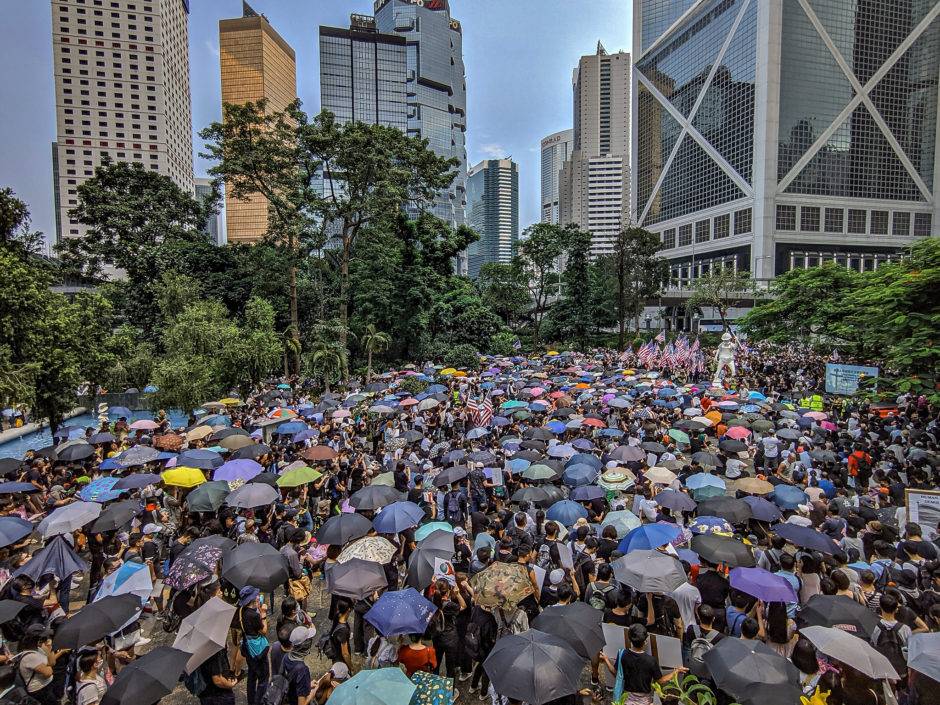
The Uyghur Case as a part of the “Global” Fight against Terrorism
UTBLICK. Another topic that came to the attention of the International Community concerns Uyghur in Xinjiang. Yesterday, the US House of Representatives condemned human rights violations by China. The Chinese Foreign Ministry claimed, however, that this is only about fighting terrorism, ‘successfully for over 3 years.’ Do you think that a trade-off between personal freedom and privacy on the one side and security on the other side is worth it over the long run?
Ambassador. We have every respect for individual freedom and rights. But, the counterterrorism and deradicalization measures, taken by the local government in Xinjiang, actually have nothing to do with individual freedom and rights.
We know that Sweden is also a victim of terrorism, and terrorism is a common enemy of all mankind. Measures need to be taken against terrorism and extremism, which is international consensus. What has been done in Xinjiang over the past 3 years is to help the people, who have been slightly affected by terrorism and extremism, who have slightly been engaged in terrorist behaviours to go to school and receive education, getting some skills, so they can re-enter the society and get some income so that they can stay far away from being affected by terrorism and extremism. These measures do not target any specific ethnic group. The targeted people have been the ones that have been slightly affected by terrorism and have engaged in slight terrorist behaviours.
Actually, the counterterrorism measures are part of the global fight against terrorism. As you said, the past three years in Xinjiang never saw a single terrorist attack. Those people that have been affected by terrorism and extremism in the past – after receiving education – they are able to find a job and enter society again. And stability in Xinjiang has been restored.
Around 1.5 million people have “received education” in internment camps in Xinjiang.
Trade Comes First
UTBLICK. Do you think that the bill passed by the US concerning the Uyghur community, will influence the trade talks between the US and China?
Ambassador. Undoubtedly, the very act by the US to use its internal law to interfere in another country’s international affairs will have a negative impact on our relations. Personally, I do not think that there is a direct link between the US passing a law, interfering in our domestic affairs, and the trade talks. Still, there is no doubt that this will have a negative impact on the atmosphere of our bilateral relations.
UTBLICK. President Trump said he wants to impose tariffs against French products as a retaliation to tax American tech firms. Therefore, could China and the EU be allied against the US trade policy?
Ambassador. First of all, it’s not just China or France, it’s countries around the world, standing against President Trump’s habit of using tariffs to pressure other countries. China, France and all EU countries stand firmly for free trade and against protections and, on this page, China and the EU stand together. China, France and other EU countries are against US policies of using tariffs for trade negotiations.
In January, Donald Trump and Liu He signed the US-China “Phase One” trade deal. Yet, a “Phase Two” deal is uncertain.
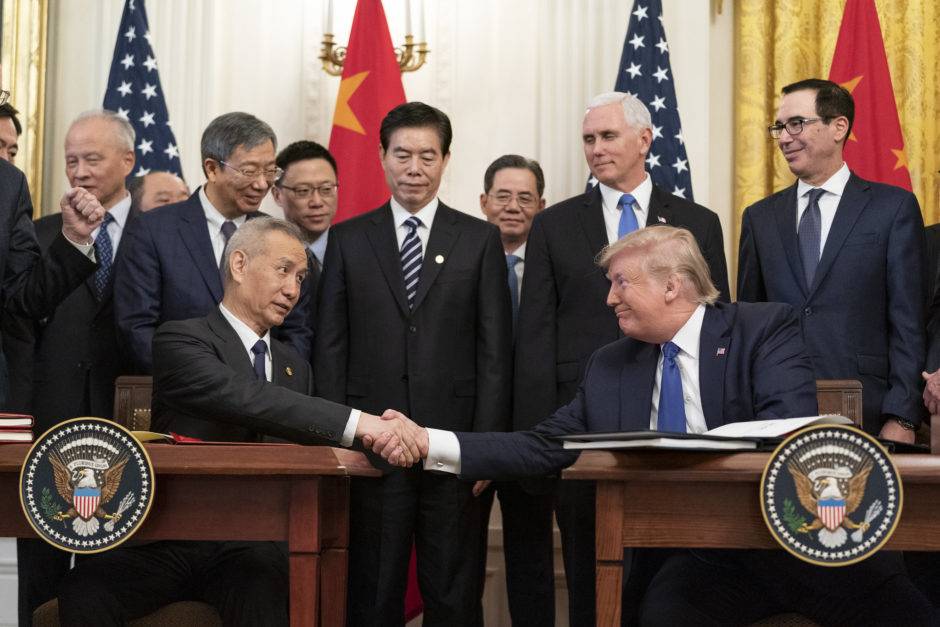
China and the EU to Cooperate on Eurasian Connectivity
UTBLICK. This brings us to another topic; the Belt and Road Initiative (BRI). Most corporations and EU countries welcomed the Chinese initiative. However, EU institutions are more reluctant. For instance, they signed an infrastructure deal with Japan in September this year [2019], to counter the BRI. What would you think is the EU’s long-term goal concerning the BRI. How would you evaluate these developments, which do not seem to be in favour of China’s Going Global strategy?
Ambassador. First of all, we welcome cooperation between the EU and Japan but we hope such cooperation does not target a third party, does not target China. In fact, we have reached an agreement with the EU to connect their strategy of Eurasian connectivity together with the BRI.
In fact, these initiatives are all about improving connectivity throughout the Eurasian continent. The EU has come to realize that the lack of infrastructure development in Asia and Europe hindered the development of this region. Therefore, from this perspective, the strategy and initiative from us, the BRI, and the connectivity initiative by the EU are on the same page. These two initiatives have the same goal, that is to improve infrastructure in our two continents. Then, why can’t we cooperate with each other? Therefore, cooperation should be the only choice for China the EU and for other Countries on the two continents.
UTBLICK. This year, the first train connected Chengdu and Vienna. Since 2016, trains connect Belarus and China. How would you evaluate this? Where do you think we are going, and might Sweden be part of it?
Ambassador. China-EU free trade significantly improved cooperation between China and EU countries. In the past, if you only relied on routes on the sea to transport products, it will take more than 40 days to reach Europe, and it would cost more. Now, with the China-Europe train, it will only take 15 days and cost less.
The very existence of the train routes fulfils the need of Chinese companies to have more trade cooperation. It also helps the economic development of the countries along the traffic routes.
These roads also have significant political and strategic significance for countries along the route. That is what a Swedish friend told me: “Trade will eliminate the possibility for wars, bring peace. Because trade not only benefits economic development but also interpersonal communication, also strengthens relations between countries.” This will move the relations of countries along the route to be more interconnected with each other and to be more friendly. So, to avoid war and conflict, so, as we have more trade, there is a higher possibility for peace.
Italy, member of the EU and G7, signed in 2019 on to China’s Belt and Road Initiative.
China Supports Changes within the U.N.
UTBLICK. This leads us to a question about the UN Security Council: China has done a lot to improve the status of so-called developing countries. Yet, in the Security Council, developing countries are still overruled by permanent members. Therefore, should the veto powers and some permanent seats be assigned to developing countries?
Ambassador. This is a very big topic you’re referring to. UN member states have been in discussions for many years and have not come to reach a conclusion. One thing is certain, that is; The United Nations was founded immediately after the Second World War in 1945. Now, it’s over 70 years old. The situation of the world today is very different from that of 70 years ago. A major global change is the rise of the developing world, including countries in Asia, Latin America and Africa. These countries need to have more participation in international affairs.
So, it is necessary, for things to be done in the Security Council, to reflect the change of the status of the developing world. But, the UN has more than 190 countries. How should the reform be carried out in the Security Council, so that we can be more representative of the interests of developing countries? It is something that has to be thoroughly discussed by its member states. The situation is that the Security Council’s members and UN members are yet to reach this conclusion. The negotiation needs to go on. But, no matter how the negotiation goes, one consensus has been reached by Security Council members and UN members in general: The Security Council needs to be more representative of developing countries. Like you said, I think this is the right direction to move to. As long as we set the right direction for the reform, for negotiation and consultation, on equal footing by the member states of the UN and the Security Council, I believe that it will be realized one day.
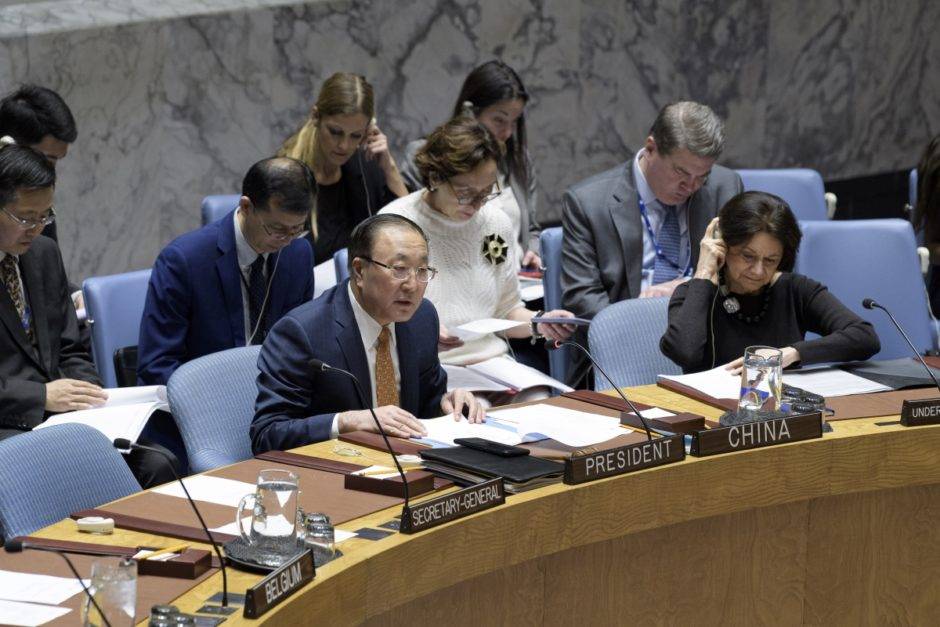
China Refuses Third-Party Mediation in the South China Sea Conflict
UTBLICK. Let us go to a more regional topic; the South China Sea. For several years ASEAN has tried to conclude a Code of Conduct (COC) for the sea. In August, the European External Action Service has suggested the parties to take a mediator into consideration. The South China Morning Post commented that Beijing could learn from the Baltic, Mediterranean and the North Sea. Eventually, to improve regional stability, do you think that China will be willing to take a third party mediation into consideration?
Ambassador. First of all, disputes in the South China Sea are between China and ASEAN countries. They are bilateral matters. China is negotiating with relevant countries to formulate a COC that is targeted at managing the South China Sea. As far as I know, the negotiation is almost approaching its end. If there are any lessons we can learn from other cases it is that third-party mediation will only worsen the situation. I believe the EU has already enough on its plate, for example, how to improve the economic development of EU member states and how to strengthen the internal unity of the EU.
In 2017, around 40% of global liquefied natural gas trade circulated through the South China Sea.
China’s Priority: Internal Affairs or US Hegemony?
UTBLICK. Some questions were already hinting at the rivalry between China and the US. Would you confirm that the PRC is de facto challenging the position of the US as a global leader?
Ambassador. The question if China is challenging US dominance is a question that is always encountered by our foreign Ministry or the Chinese government and even our president himself. Actually, what we focus on, our government is the internal development of our country. This is to deliver a better life to people. We have no willingness, intention or capacity to challenge US dominance. As you know, China is the only major country in the world that is yet to realize its complete national unification. There are still some people in Taiwan, Hong Kong and Tibet that are trying to separate from China. So, our most important mission is to safeguard the territorial integrity and our sovereignty.
Economic wise, though, we are the second-largest economy in the world. But, on a per-capita basis, we are at less than $10,000 per person, whereas the per capita GDP in Sweden is over $ 50,000. I’m not exactly sure what it is of the US, but it says a lot about the gap between us and the US. And, from a military perspective; the US maintains troops in over a hundred countries, and has military bases in about 40 countries. Whereas China does not have such military bases abroad, and it is forbidden by our constitution. At such conditions; how do we challenge US dominance?
And at the end of the day, the basic principle of our foreign policies is to broadly make friends and cooperate with countries around the world. It is not to interfere in their domestic affairs and not to seek dominance. And, we do not wage wars either. Then, how do you challenge US dominance?
The US sometimes thinks too much, which is also a sign of insecurity by the US. The world is so big, the situation is so complex, there are so many countries in the world. The role of the world police is actually very consuming and demanding. The US is indeed very exhausted from interfering in so many affairs of countries around the world. And, the party and government of China have a different perspective. We want to manage our internal affairs well first.
UTBLICK. You mentioned that China has no military bases abroad; Yet, there are reports about a Chinese military base in Djibouti. How would you describe that?
Ambassador. Indeed, there is a station of our military in Djibouti, but that is to supply forces. The station is there because China is part of the counter-piracy efforts at the Horn of Africa around Somalia. The naval vessels need to be supplied and rotated according to their calendars. For our vessels to go to participate in this anti-piracy missions and to come back they need to be resupplied. So, it’s not a military base rather it’s a supply station.
The USA spends 3,2% of its GDP into military expenditures, compared to China’s 1,9%. Considering purchasing power parity that is 74% of the US’ budget.
Confucius Institutes, a Threat to NATO’s Security?
UTBLICK. Another question, coming back to Europe: NATO has, in a paper from last year, called Confucius Institutes a threat to national security interests. Around 2015, several countries have decided not to extend existing contracts and, last month, their director Mr Song was banned from entering the Schengen area. Have Confucius Institutes been an issue in your career, and is it an issue in Sweden today?
Ambassador. The work of Confucius Institutes has nothing to do with diplomacy. It’s under the educational authorities in China. You know, why we have Confucius institutes is, in the first place, because China is growing and developing. More and more foreign friends want to come to work and study in China. As you may know, Mandarin is one of the hardest languages for foreigners to learn. For that fact, foreign friends hope China could send Chinese teachers to teach them Mandarin. That’s why we have Confucius institutes. It’s to help foreign friends to learn the language. Language is the carrier of culture. And of course, when they teach the Chinese language they will also introduce Chinese culture to the students. So, Confucius Institutes are about language education and cultural exchanges. I hope our friends will be more objective about Confucius Institutes.
UTBLICK. Thank you very much.
Ambassador. Thank you. We welcome you to continue to be interested in China!









